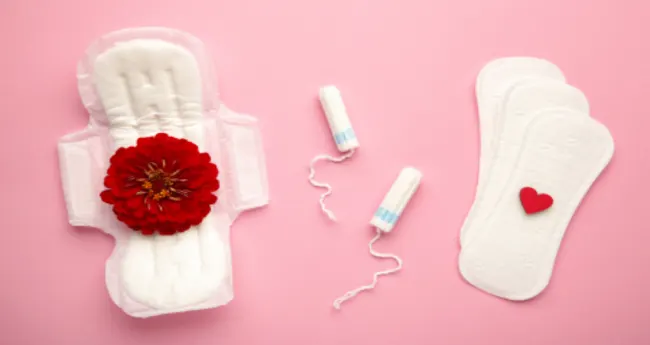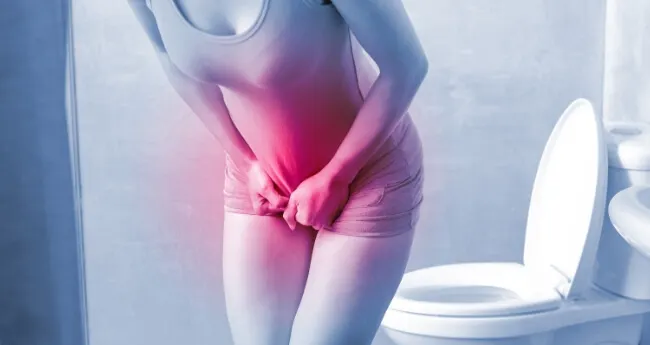Can A UTI Delay Your Period? Let’s Find Out

If we had to answer the question ‘if UTI can stop your period?’ in one word, it would be a solid no. Although UTIs or urinary tract infections impact the bladder and urethra, they do not have any direct impact on the hormonal system.
However, UTIs may impact other functions of the body thereby delaying your period for a little while, just like any other form of infection or weakness that can impact your hormonal system.

What causes UTI?
UTIs or urinary tract infections are caused due to a bacterial infection of the urethra or bladder. It can be caused due to several different factors such as:
1. Intercourse
Although the infection can be a result of numerous different external factors, a common cause of UTI in women, especially in sexually active women, is intercourse. This is caused as a result of thrusting movement which can sometimes introduce bacteria to the urethra and bladder, thus causing infection.
2. Wrong Hygiene Habits
Wrong hygiene habits like wiping your vagina from back to front can increase the risk of infection. Since in women, the anus and urethra are situated in close proximity, the risk of infection is always higher. The E. coli bacteria found in the gastrointestinal tract can easily travel to the urethra when you wipe from the back to the front or when you have diarrhoea.
3. Fluctuating hormone levels
Fluctuating hormone levels, especially during menopause, can result in a fall in oestrogen production in females that can cause a hormonal imbalance. This imbalance in turn makes the vaginal area more sensitive and prone to external infections.
4. Low quality hygiene products
Low quality hygiene products can disrupt the pH levels of your vagina and thus make it more prone to infections. When your hygiene products do not absorb and lock in liquids properly, the damp conditions and locked-in heat can encourage infections.

Can UTI delay your period?
Since the urethra is situated right in front of the vagina, a delay in the period can understandably be misinterpreted to be a result of a UTI infection. However, even if you are experiencing a UTI, your delay in period is most probably not related to it. It is also highly improbable because the anatomical parts responsible for both the functions are different.
We say most probably because your hormonal system can, in some cases, come under stress and cause an imbalance when fighting an infection. Therefore, if not directly, a UTI might cause a slight disturbance in your menstrual cycle, indirectly.
However, UTIs and periods do have a connection where your chances of getting a UTI become higher when you are menstruating. The reason behind this is that when you menstruate, the level of estrogen (which has high inflammatory properties) decreases in your body, thus making you more susceptible to infections.
Can UTI antibiotics delay your period?
The antibiotics that you take to fight UTIs can sometimes impact the hormone levels in your body, causing a slight delay in your period. The good news is that the antibiotics can delay the period but do not cause it to stop completely. So, if you have missed a few periods while dealing with UTI, it is advisable to visit a doctor.
Common symptoms of UTI
The most common UTI symptoms in females include:
1. Smelly urine
2. Cloudy urine
3. Bloody or light pink urine
4. Pelvic pain
5. Burning sensation upon peeing
6. Constricted urination
7. Consistent urge to pee
If you are experiencing any of the above symptoms along with or without a delayed period, it is recommended that you consult a doctor and get a urine test done if required.

How to prevent UTIs during period?
There are several small steps and precautions that you can take every day to escape UTIs. Here are a few:
Right menstrual products
Using the right menstrual products can make a huge difference when you are aiming to prevent urinary tract infections. High-quality sanitary pads and tampons can be your best bet for maintaining optimal level of menstrual hygiene. Try the ALWAYS Cotton Soft Pads which have an innovative soft design to provide cushiony comfort. These pads are equipped with an absorbent core that locks the menstrual discharge and keeps you protected. Likewise, the flexible wings keep the pad in place and allow you worry-free movement.
For tampon users, ALWAYS Tampax Cardboard Tampons are a great pick as they have an innovative absorbent core and protective skirt, all of which keep you secure and protected. These tampons come with anti-slip applicator that delivers smooth insertion. Additionally, they are made available in different sizes to provide the best absorbency based on your flow.
Toilet paper etiquette
Since urinary tract infections are caused by e coli bacteria found in faecal matter, it is important that you wipe your poop from front to back. Doing so keeps the bacteria away from the urinary tract, helping you avoid any infections.
Don’t hold in your pee
This is important because when you do not empty your bladder by peeing, you are risking bacterial growth. Therefore, it is important that you pee every three to four hours and when you do, ensure that your bladder is completely empty.
The easiest way to do so is by sitting on the toilet for a few more minutes after you have peed and waiting. You can also rotate your pelvic region in circular motions to ensure that any urine sitting around in the bladder also gets emptied out.
Drink plenty of liquids
When you drink six-to-eight glasses of liquid every day, you are making sure that the bacteria are regularly flushed out of your system when you pee. Therefore, this is the easiest way to ensure that you do not get UTIs. If you find it hard to drink the required amounts of water, you can always consult your doctor and ask him if you can replace it with other liquids like lemonade, juices, tea, etc.
Take probiotics
Since probiotics help your system by increasing the number of good bacteria in your gut, they help prevent infections like UTIs. You can include foods like tempeh, yogurt, kefir, etc. that act as natural probiotics in your diet after checking with your doctor or nutritionist. Additionally, you can also take probiotic supplements after consulting with your doctor.
Clean up after intercourse
It is important that you clean your private parts thoroughly every time after you have an intercourse in order to get rid of unwanted bacteria. Peeing before and after intercourse is also a great way of ensuring that your private parts are clean and free of unwanted bacteria.
How do you treat UTI?
Most UTIs can be easily treated. You can visit a doctor and they can prescribe the right medicine, depending on the cause of the infection. The treatments can include:
- Antibiotic medication
- Increased intake of liquids
- Taking probiotics
- Introducing cranberries to your diet
- Switching birth control method after’s doctor’s consultation
When to consult a doctor?
Although most UTIs require simple medication and are easily curable, it is still advisable that you consult a doctor as soon as you experience any symptoms. We say this because in some cases, the infection can reach the kidneys causing serious issues.
Takeaway
Although the simple answer to, ‘Can UTIs delay periods?’ is no, they don’t, the extended answer is they might, indirectly. The mental and/or physical stress related to UTIs can have an impact on your hormones and cause a delay.
Now keep a track of your ovulation period with Aways Fertile Days Calculator.
FAQs
1. Can a bladder infection delay your period?
No, a bladder infection, like any other UTI cannot delay your period. However, mental and physical stress that accompanies bladder infection or the side-effects of certain anti-biotics can delay periods.
2. What are the UTI symptoms in females?
Females can experience UTI symptoms like:
Cloudy or bloody urine
Fouls smelling urine
Burning sensation upon peeing
Constant urge to pee
Pelvic pain in women
If you are experiencing any of the above symptoms, it is recommended that you visit a doctor.
3. What are the most common causes of UTI during period?
The most common causes of UTI during period are:
- Fluctuating hormone levels
- Approaching menopause
- Low quality hygiene products that are kept for too long
- Wiping the private parts in an improper manner
- Intercourse
Disclaimer:
Please note the date of the last review or update on all articles. No content on this site, regardless of date, should ever be used as a substitute for direct medical advice, diagnosis or treatment from your doctor or other qualified clinician. Always is committed to ensuring that all of our products meet rigorous safety standards; Always pads prioritize safety, protection and comfort of its consumers.




